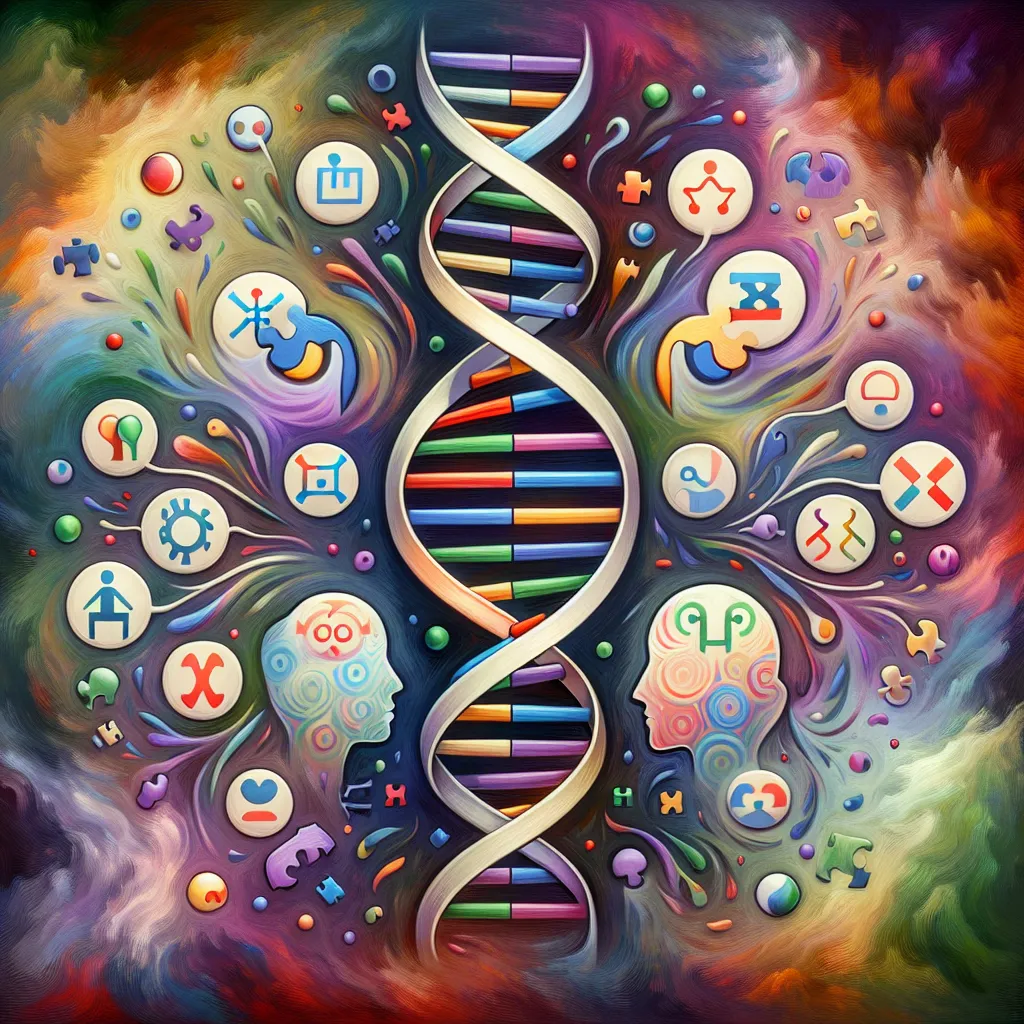The Genetic Basis of Personality: An Overview
Personality has long fascinated psychologists, sociologists, and biologists alike. This complex web of characteristics that defines a person’s unique behavioral patterns is influenced by a myriad of factors, and among these, genetic makeup holds a significant place. Understanding the genetic basis of personality is a crucial step in unraveling the intricate dance between nature and nurture. This article explores the depths of this fascinating subject, shedding light on how our genetic blueprint may shape who we are.
Personality is a multifaceted construct that encompasses a wide range of behaviors and emotional patterns. From the introverted to extroverted, pragmatic to whimsical, each individual displays a set of traits that is remarkably distinct. The question that then arises is: to what extent is personality inherited? Research suggests that genetics plays a pivotal role, but it is not the sole determinant of personality.
Genetic Factors Influencing Personality
Twin studies have been a traditional starting point for exploring the genetic basis of personality. Identical twins share 100% of their genes, while fraternal twins share approximately 50%, just like any other siblings. By comparing similarities in personalities between identical and fraternal twins, researchers have been able to estimate the heritability of specific traits. Interestingly, studies consistently find that identical twins tend to have more similar personalities than fraternal twins, highlighting the impact of genetics. Estimates suggest that between 30% to 50% of personality traits could be heritable.
At the molecular level, genes can influence how neurons communicate in the brain, impact hormonal levels, and contribute to the structure and function of the brain, all of which are intimately tied to personality. For example, the neurotransmitter serotonin is associated with mood regulation, and variations in genes related to serotonin transport and reception can influence traits such as anxiety, happiness, and mood stability.
Dopamine, another neurotransmitter, is linked to the reward system in the brain. Genetic variants that affect dopamine function are believed to contribute to traits like novelty seeking and impulsivity. Similarly, oxytocin and vasopressin are hormones that have been connected to social bonding and affiliative behaviors, and genetic differences in their receptors may influence social traits like empathy, trust, and interpersonal relationships.
The Five-Factor Model and Genetics
The Five-Factor Model, or the Big Five, is one of the most widely accepted frameworks for studying personality. It consists of five broad dimensions: Openness, Conscientiousness, Extraversion, Agreeableness, and Neuroticism (OCEAN). Each factor represents a spectrum along which individuals may vary, influencing how they perceive the world and interact with others.
Researchers have investigated the genetic underpinnings of these factors, finding that each one exhibits a degree of heritability. For instance, extraversion, which encompasses assertiveness, sociability, and excitement-seeking, has been linked to genetic variations influencing dopamine pathways. Neuroticism, relating to emotional stability, anxiety, and moodiness, also shows a genetic basis, often pointing to serotonergic pathways. Openness, conscientiousness, and agreeableness have been less studied genetically, but emerging research suggests they, too, have genetic components.
Limitations of Genetic Research
While there is a genetic basis to personality, it is critical to acknowledge the limitations of this area of study. Genes do not function in a vacuum; instead, they interact with the environment in complex ways. Environmental factors from prenatal development to life experiences play a critical role in shaping personality. Traits may be influenced by genetic predispositions, but how these tendencies are expressed can be significantly molded by the environment.
Additionally, the field of behavioral genetics is fraught with methodological challenges. Personality is not dictated by a single gene or a simple inheritance pattern. Rather, it is polygenic, involving many genes, each contributing a small portion to the overall phenotype. Pinpointing specific genetic influences among this polygenetic backdrop is challenging, requiring large, diverse samples and robust statistical approaches.
The Epigenetic Perspective
Going beyond the static view of genetics, the field of epigenetics provides a dynamic perspective on how genes and environment interact to shape personality. Epigenetic mechanisms, such as DNA methylation and histone modification, can turn genes on or off in response to environmental stimuli. These changes can be long-lasting and may even be passed down through generations, illustrating the fluid nature of genetics as it pertains to personality.
Conclusion
The genetic basis of personality is a complex and fascinating field that bridges multiple disciplines. The interplay of hundreds if not thousands of genes combined with the influence of environmental factors creates the vibrant tapestry of human personality. While genetics offers profound insights into the predispositions that shape who we are, it is important to remember that our genes are not our destiny. Personality is dynamic and can evolve over time, reflecting the ongoing dance between our genetic makeup and the world around us.
Understanding the genetic underpinnings of personality has significant implications across various domains, from psychological therapy to personalized medicine. By appreciating the role of genetics, we move closer to a future where interventions can be tailored to the individual, fostering better mental health outcomes, and the potential to thrive in diverse environments.
In conclusion, the genetic basis of personality remains a burgeoning field ripe with discovery. As research continues to advance, propelled by the latest technological advancements in genomics and neurobiology, we can look forward to unraveling more of the mysteries that declare the depths of our individuality. This knowledge not only enlightens our scientific understanding but also nurtures a greater compassion for the rich diversity that defines the human experience.



Leave a Comment